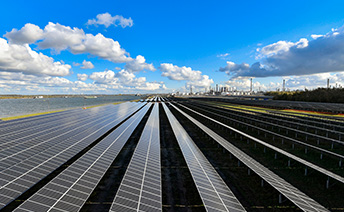BusinessEurope
BusinessEurope represents companies across the European continent and campaigns on issues that most influence their performance.[1] Its direct members are national business federations.[2] Shell is a partner company of BusinessEurope, which means we can participate in working groups but do not have voting rights.
Membership of board/executive committee: None
- 2022 assessment outcome: Aligned
- 2021 assessment outcome: Aligned
Summary
Shell benefits from being a partner company of BusinessEurope, in particular through the association’s role in the EU policy debate on the global competitiveness of European industry. Our participation provides us with a platform to interact with representatives of national business associations.
We found BusinessEurope to be aligned with our climate and energy transition-related policy positions.
We will remain a member of BusinessEurope. We will continue to track alignment between BusinessEurope’s climate and energy transition-related policy positions and our own.
Further information
Click on the sections below to read more.
Paris Agreement and net-zero emissions
- BusinessEurope has stated support for the temperature goal of the Paris Agreement.[3]
- BusinessEurope has stated support for the EU Green Deal’s target to achieve net zero by 2050.[4]
- In a November 2022 position paper “BusinessEurope expectations for COP27”, BusinessEurope stated that “all G20 countries should agree to similarly ambitious 2030 targets in their NDCs [Nationally Determined Contributions], as well as credible long-term decarbonisation strategies.”[5]
Carbon pricing
- BusinessEurope has stated support for carbon pricing and the EU Emissions Trading System (ETS).[6] [7]
- In a November 2022 position paper “BusinessEurope expectations for COP27”, BusinessEurope stated: “The fragmented nature of existing carbon pricing regimes creates increasing operational risks to companies. Overcoming this fragmentation will enable companies to partner with governments and facilitate decarbonisation at the lowest possible cost to society.”[8]
- In a press release from December 2022, BusinessEurope stated that “it is essential that negotiators strike a balanced deal on the ETS and CBAM [Carbon Border Adjustment Mechanism]” and that “we need a cautious and prudent approach to the gradual application of the CBAM until the mid-2030s.”[9]
Energy efficiency
- BusinessEurope has stated support for energy efficiency policy to help achieve EU climate targets.[10]
Decarbonised hydrogen
- BusinessEurope has stated support for the role of decarbonised hydrogen.[11] [12] [13]
Natural ecosystems
No position
Carbon capture and storage
- BusinessEurope has stated that carbon capture and storage is one of the technologies needed to decarbonise the economy.[14]
Environmental, social and governance (ESG) standards and benchmarks, sustainable finance taxonomies
- BusinessEurope has stated support for a “clearer and more coherent framework for sustainability reporting at the European level”.[15] It has also stated support for international standards for sustainability reporting.[16]
- BusinessEurope has stated that the EU Sustainable Finance Taxonomy can “become a facilitator of the businesses’ transition”.[17]
Coal
No position
Electrification with renewable or low-carbon power
- BusinessEurope has stated support for electrification with renewable and low-carbon energy sources to help meet climate ambitions.[18]
- In its November 2021 Fit for 55 position paper, it highlighted the need for a “stable and consistent governance framework, as well as the necessary flexibility regarding specific targets and incentives for the renewable-based electrification of end-use sectors”.[19]
- In its 2022 Stockholm Declaration – BusinessEurope’s Council of Presidents, BusinessEurope stated that Europe needs a “functioning energy market, which incentivises investments in low-carbon technologies, grids, and interconnectors and progress towards EU’s long-term goal of achieving net zero emissions by 2050”.[20]
Gases and methane
- BusinessEurope has stated that renewable and low-carbon gases should serve as a “stepping stone, enabling emission reductions in the short and medium term”.[21]
Road transport: Passenger cars and vans
- BusinessEurope has stated support for a “technology and fuel-neutral” approach to low-carbon transport.[22] In its November 2021 Fit for 55 position paper, BusinessEurope states that the EU’s proposed “100% reduction, tailpipe-only 2035 target for CO2 emissions for cars and vans is exclusionary and not in line with the principle of technological neutrality. It disincentivises investments into crucial technologies such as liquid low-carbon and renewable fuels”.[23] Shell supported the EU’s proposal to ban sales of internal combustion engine cars and vans in the EU from 2035. We believe that BusinessEurope and Shell are aligned on the overall objective of decarbonising light-duty transport, but have different views on the plan to achieve it.
- In its 2022 position paper on the Alternative Fuels Infrastructure Regulation (AFIR) Trilogue, BusinessEurope stated support for the European Parliament’s proposed targets for electric road charging points and support for higher ambition for hydrogen refuelling stations.[24] It states that this high level of ambition will be required to meet the EU’s proposed CO2 standards for cars and vans.[25]
Road transport: Heavy-duty vehicles
- In its November 2021 Fit for 55 position paper, BusinessEurope stated support for the role of “vehicles using low or zero well-to-tank emissions fuels such as biofuels, hydrogen and synthetic fuels, along with – in the short and medium term – compressed and liquified natural gas, especially in hard-to-abate transport where direct electrification of transports is not possible”.[26]
Heavy industry decarbonisation
- In its November 2021 Fit for 55 position paper, BusinessEurope stated that “Climate ambition must go hand-in-hand with industrial competitiveness and feature the zero- and low-carbon solutions to deliver on its objectives. To be able to deliver, proper framework conditions from the continuous availability of renewable and low-carbon energy at competitive prices and a historic investment programme need to be in place.”[27]
Aviation
- In its November 2021 Fit for 55 position paper, BusinessEurope stated that the “ReFuelEU Aviation Regulation gives a good impulse for the progressing decarbonisation of the aviation industry”, adding that the “blending mandate, coupled with an uptake obligation, should provide sufficient flexibility until the European market for SAFs has matured”.[28]
- In its 2022 letter to the European Parliament, BusinessEurope commented on the EU’s proposed ReFuelEU Regulation Aviation, calling for “ambitious but achievable quotas for SAF” (sustainable aviation fuels), “an effective SAF flexibility mechanism” and a “focussed review clause”.[29]
Shipping
- In its November 2021 Fit for 55 position paper, BusinessEurope stated support for the “underlying ambition of tackling greenhouse gas emissions from the maritime shipping sector at the EU level” in the FuelEU Maritime Regulation.[30] It also stated “a global approach to pricing emissions in maritime shipping at IMO level would have been much preferrable to unilateral EU action. The EU should continue to push for such a system and align its carbon pricing with it once one emerges.”[31]
[1] https://www.businesseurope.eu/mission-and-priorities
[2] https://www.businesseurope.eu/mission-and-priorities
[3] https://www.businesseurope.eu/policies/energy-and-environment/climate-change
[4] https://www.businesseurope.eu/policies/energy-and-environment/climate-change
[5] https://www.businesseurope.eu/sites/buseur/files/media/position_papers/iaco/2022-11-3_businesseurope_expectations_for_cop27.pdf
[6] https://www.businesseurope.eu/sites/buseur/files/media/position_papers/rex/2020-06-22_what_can_trade_can_do_for_climate_0.pdf
[7] https://www.businesseurope.eu/sites/buseur/files/media/position_papers/iaco/2021-02-05_eu_ets_revision_-_reply_to_consultation.pdf
[8] https://www.businesseurope.eu/sites/buseur/files/media/position_papers/iaco/2022-11-3_businesseurope_expectations_for_cop27.pdf
[9] https://www.businesseurope.eu/publications/trialogues-emission-trading-system-and-carbon-border-adjustment-mechanism
[10] https://www.businesseurope.eu/publications/fit-55-package-businesseurope-position-paper
[11] https://www.businesseurope.eu/sites/buseur/files/media/position_papers/iaco/2021-11-18_pp_fit_for_55_package.pdf
[12] https://www.businesseurope.eu/sites/buseur/files/media/position_papers/iaco/2021-06-18_gas_networks_-_reply_to_consultation.pdf
[13] https://www.businesseurope.eu/sites/buseur/files/media/position_papers/iaco/2021-11-18_pp_fit_for_55_package.pdf
[14] https://www.businesseurope.eu/sites/buseur/files/media/position_papers/iaco/2021-11-18_pp_fit_for_55_package.pdf
[15] https://www.businesseurope.eu/sites/buseur/files/media/position_papers/social/2021-07-14_pp_corporate_sustainability_reporting_directive.pdf
[16] https://www.businesseurope.eu/sites/buseur/files/media/position_papers/legal/2021-01-20_sustainability_reporting_ifrs_foundation_-_reply_to_consultation.pdf
[17] https://www.businesseurope.eu/sites/buseur/files/media/position_papers/iaco/2021-06-02_pp_april_taxonomy_package.pdf
[18] https://www.businesseurope.eu/sites/buseur/files/media/position_papers/iaco/2021-11-18_pp_fit_for_55_package.pdf
[19] https://www.businesseurope.eu/sites/buseur/files/media/position_papers/iaco/2021-11-18_pp_fit_for_55_package.pdf
[20] https://www.businesseurope.eu/sites/buseur/files/media/position_papers/2022-11-25_stockholm_declaration_-_businesseurope_council_of_presidents.pdf
[21] https://www.businesseurope.eu/sites/buseur/files/media/position_papers/iaco/2021-06-18_gas_networks_-_reply_to_consultation.pdf
[22] https://www.businesseurope.eu/policies/energy-and-environment/climate-change
[23] https://www.businesseurope.eu/sites/buseur/files/media/position_papers/iaco/2021-11-18_pp_fit_for_55_package.pdf
[24] https://www.businesseurope.eu/sites/buseur/files/media/position_papers/iaco/2022-12-09_businesseurope_position_paper_on_afir_trilogue.pdf
[25] https://www.businesseurope.eu/sites/buseur/files/media/position_papers/iaco/2022-12-09_businesseurope_position_paper_on_afir_trilogue.pdf
[26] https://www.businesseurope.eu/sites/buseur/files/media/position_papers/iaco/2021-11-18_pp_fit_for_55_package.pdf
[27] https://www.businesseurope.eu/sites/buseur/files/media/position_papers/iaco/2021-11-18_pp_fit_for_55_package.pdf
[28] https://www.businesseurope.eu/sites/buseur/files/media/position_papers/iaco/2021-11-18_pp_fit_for_55_package.pdf
[29] https://www.businesseurope.eu/sites/buseur/files/media/public_letters/iaco/2022-12-02_aaf-meps_-_aviation_trialogues.pdf
[30] https://www.businesseurope.eu/sites/buseur/files/media/position_papers/iaco/2021-11-18_pp_fit_for_55_package.pdf
[31] https://www.businesseurope.eu/sites/buseur/files/media/position_papers/iaco/2021-11-18_pp_fit_for_55_package.pdf










